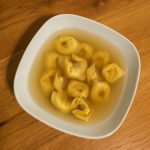Some pasta recipes call for cooking the pasta noodles in beef broth (instead of in salty water). Their authors claim that the beef broth adds an aroma and flavor that salt alone doesn’t. And that, unless you take them up on the advice, your dish won’t come out tasting as well.
Is that really the case, though? Can you (and should you) cook pasta in beef broth?
Here’s my honest opinion on the topic.
Pasta should be cooked in generously-salted water. While there’s no specific reason why you couldn’t boil pasta noodles in beef broth, that’s not really necessary unless you’re making pasta in brodo, an Italian soup that consists of pasta cooked in clear broth.
I’ll tell you all about pasta in brodo in a minute or two. Before that, let’s talk a little bit about the practicality of cooking pasta in broth for other recipes, like spaghetti with tomato sauce.
The simple truth is that, in 99% of your pasta dishes, you won’t notice much of a difference between pasta noodles cooked in beef broth and those cooked in salty water.
Boiling pasta is as much about rehydrating the noodles as it is about cooking them through.
This is because pasta, fresh and dried, has some of its moisture taken away. When you add the noodles to the water, they soak that moisture back up.
This is also why if you overcook the noodles or leave them in the water, they’ll come out irreversibly soggy and unappetizing.
Salt dissolves in water. When you cook pasta in salty water, the pasta soaks it up as it rehydrates—getting naturally seasoned from the inside as it cooks.
Whether that salt comes from sea crystals or bouillon cubes doesn’t make as much difference as some food bloggers and TV chefs claim.
Any subtle differences will get overwhelmed by and lost in the acidity of the tomato sauce or creaminess of the egg, cheese, or hard cream.
So save your beef broth (or chicken bouillon, or mushroom stock) for something else and cook 99% of your pasta in salted water.
That 1% is for the times when you’re making pasta in brodo, which actually calls for beef broth.
Pasta in Brodo

Here’s something about cooking pasta in beef broth that not everyone will tell you: It’s actually a thing in Italy.
Pasta in brodo, which translates as “pasta in broth,” is a technique for making pasta soup that comes from traditional Italian cuisine.
When using this technique, egg noodles, dried pasta, or stuffed dumplings like tortellini and gnocchi are cooked and served in clear beef broth.
Apart from tap water, this soup has only two other ingredients: pasta and beef broth. Needless to say, they need to be of exceptional quality for the soup to come out tasting well.
To make pasta in brodo, simply cook the pasta in broth, plate, and serve. You have to appreciate the genius of Italian home cooking. There’s no other cuisine in the world that’s capable of getting so much texture, aroma, and flavor from so few ingredients and steps.
Just don’t use bouillon cubes. While you’ll barely notice the difference if you’re making a beef stew with thick cubes of meat and big slices of vegetables, the lack of depth and breadth of the cooking water will really stand out in this dish.
If, for one reason or another, you want to avoid eating bone broth, substitute mushroom stock for beef broth. Your pasta in brodo will come out tasting just as well, if not more delicious, than the original.
Conclusion
Yes, you can cook pasta in beef broth. But, unless you’re making pasta in brodo, a traditional Italian soup that consists of pasta cooked in broth, you don’t really need to.
The difference in aroma and flavor is too subtle and significantly less than most food writers claim. It’s likely to get “lost in translation” as you toss the noodles with the sauce.
You’re better off using beef broth where you actually needed it—and cooking your pasta noodles in salty water. As Italian chefs like to say, pasta water should taste like the sea.

